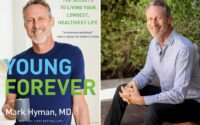Experts are warning against the viral 75 Hard fitness program
Chill workouts such as Hot Girl Walks and Treadmill Struts may be all the rage with the TikTok crowd, but some are still opting for the high-impact fitness approach.
The latest limit-tester is the punishing 75 Hard Challenge, which has gone viral with 1.7 billion views on the social media app.
Scores have signed up for the regimen — a 75-day program where the participant must follow a diet (up to their own discretion), complete two 45-minute workouts (one of which must be outside), not partake in any alcohol or cheat meals, take a daily progress picture, drink one gallon of water, and read 10 pages of a book.
If a day goes by without one of these tasks being checked off, people have to restart.
Experts are warning the plan may be too intense and can do more harm than good.

The 75 Hard program was created by Andy Frisella, a supplement seller and YouTuber. Frisella did not respond to The Post’s request for comment.
On his site, Frisella adamantly states that 75 Hard isn’t a fitness program, but rather a “transformative mental toughness program” that “can change your life” and give you “complete control.”
Frisella claims the challenge has been completed by over 100,000 people around the world.

Many have proudly documented their 75-day journeys on social media.
TikToker @missgreeneyes15 shared a video happily showing off her large stomach before and after losing 21.2 pounds in 75 days.
Sabrina Reynolds took to TikTok as well, to note how much more comfortable she feels in her body after dropping 23 pounds with the program.
Instagram user @philthemachine shared progress pictures from his first and last day in the program, which he says “pulled [him] through a nervous breakdown and totally saved [his] life,” while showing off his now-chiseled chest and toned arms.

“If you think that these physical changes are impressive, I can’t even begin to describe the mental changes that have taken place,” he wrote in the caption.
Conversely, the apps are also filled with videos of people disappointingly announcing that they “failed” the challenge and are starting over, or that they are giving up.
Global Nike trainer Lauren Schramm told The Post that she’s “strongly opposed to this type of program.”
“[It] pushes the boundaries of safety for the majority of the population and does not promote healthy levels of movement, diet and rest,” she said.
Schramm said the program “does not seem realistic for the average person.” She argued that it “promotes the idea that fitness, health and wellness are all or nothing” rather than “balancing acts.”
“I actually think there is a lot of wasted effort that would occur if you follow this plan,” the personal trainer said.

Rest is commonly noted as one of the most important elements of exercise and performance.
Muscles need time to repair themselves and your body needs a break to be able to properly absorb nutrients and to restore energy supplies, according to the National Institute for Fitness & Sport. Going without can lead to injuries.
But, there are no rest days with 75 Hard.
Barry’s trainer Daniela Celi said the program could be feasible for the right candidate with a flexible lifestyle — as long as the intensity of the workouts is closely monitored.
However, she told The Post: “It’s important to note that physical stress can also cause mental stress which may have the opposite effect of the potential benefits of the program.”
Instead of worrying about maintaining the intensely regimented program’s demands, Celi suggested “integrating fitness as part of your lifestyle, starting small and habit stacking for the highest rate of success,” reminding people that finding the most effective fitness program and lifestyle “takes trial and error.”
Along with exercise, finding the right diet and eating habits also takes a bit of experimenting.
Tara Schmidt, lead registered dietitian at the Mayo Clinic Diet, isn’t completely against the 75 Hard program — but she wants people to listen to their bodies and make the best choices for themselves.
“Sometimes a bit of a jump-start and seeing that number on the scale move is motivating,” she told The Post, adding that “if the principles of a short-term diet are unrealistic to maintain, it’s not likely to produce sustainable weight loss.”
When choosing a food plan, the nutrition expert recommends any diet that incorporates a high intake of fruits and vegetables, a focus on whole grains, healthy fats and lean proteins.
She noted that “what is most important is the composition of that diet, its health effects, and how sustainable it is for the individual long-term.”
Getting outside once a day, skipping out on alcohol and cheat meals, taking progress pictures, drinking lots of water, and reading 10 pages of a book a day can all have positive benefits, the experts noted — but they should not be forced activities.
“I understand the desire to fully commit to something, but unfortunately slow and steady wins with your body,” Schramm said.


